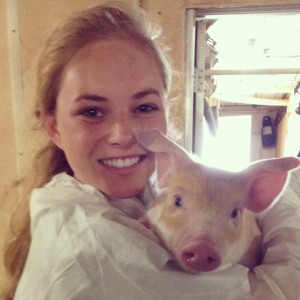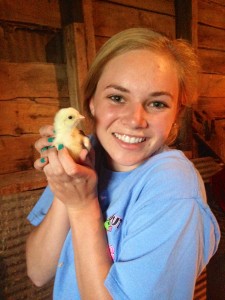Today began with the refreshing scent of hog manure. Walking into the confinement, however, I will admit it did not smell as bad as I was expecting, but when I left I did notice not the most pleasant smell following me around. We visited hog barns from farrowing to finishing and saw pigs of each and every size. Unfortunately, with the PEDv outbreak, Brent had less than half of his normal number of pigs in the finishing barn. PEDv is a huge virus that has effected numerous farms and was the reason we were not able to visit more. It was very nice of the Friest to let us in given the circumstances because it hit him especially given that all the pigs he raises are farrow-to finish; so if all they babies die, there goes his income. This is different than people who just get the pigs delivered, and raise them until market because those pigs are insured. They get the pay check no matter what and are not dealing with the dead babies because their pigs are not producing. Now farrow-to-finsih barns are rare and in Hardin county; there are only 2 people who raise pigs this style. The county is dominated by corporate hog barns, not family-owned farrow-to-finish operations. Something that has improved Brent’s breeding process though is AI, or artificially inseminationl. Boars tease the sows to come into heat and then Brent sticks a small tube into a sow’s uterus, which inserts the semen. He said one container has about 10 billion semen and costs about 5 dollars. The sows do not mind this process and what was interesting to me was that when a sow is in heat, you can apply a lot of pressure to its back and they will not move at all. Another indicator is to watch a sow’s ears. Side note about their ears, they use as markers to easily keep track of the month they were born. The notches in the pig’s ear indicates numbers getting larger the higher up they go up. If a pig has a few notches, you add them up dependent on the location.
There seems to be a lot of controversy on the way pigs are managed. In the gestation barns they are able to stand, sit, and lay down, but not turn around. The big question here is, is this okay? Brent mentioned to us that this method prevents them from hurting each other because they can be rough, so it is a form of protection. Also in the barn, they were not too wild or mean. If they were truly unhappy with their lifestyle, I feel like they would be more aggressive which they were not at all. They do have different circumstances as they move from barn to barn also, so it is not like they are in one spot forever. In the finisher barn they are together and are able to move as they choose. I do not believe this is an inhumane way to raise pigs, but at the same time I am not apposed to the way Niman Ranch does it either. There is room for coexistence in farming, which is something I have seen a lot of on this trip. We could not sustain everything off of only free range livestock and organic farming. It is nice that people who really want that option have it, but overall there is a crucial need for conventional farming.
Our second stop was to Practical Farmers of Iowa where we met with Liz Kolbe. The main thing I took away was, the issues related to pesticide drift. How do you know where it came from? How do you know what chemicals it is? Is it safe to eat? How do you treat you plants if they begin to die from it? If you are organic, do you lose your certification for three years because of the drift? How do you ensure it will not happen again? There are just so many things that go into this issue, and it is so hard for people to find answers. I never thought about this topic in depth, but it is a HUGE one. In Minnesota in 2012, it resulted a signficant legal case in which an organic farmer got drifted on and called his organic certifiier who said the farmer couldn’t sell his produce and to till his fields. When he went to court, the Minnesota Supreme Court ruled that he should not have been directed to plow his crops into the soil and could have still sold it saying it was organic because he himself did not spray the pesticides. This is scary to the consumer as well as the farmer because he/she takes a lot of pride in being organic and does not want to sell a phony product to his/her customers. Pesticide drift is a big issue and still continuing to trouble farmers because there are so many unanswered questions about the issue.
The last thing we did was go to the Fiscus farm and deliver baby chicks. They were so cute and so fun to hold. We dipped their beaks in water so they knew how to drink and then placed them under the heat lamp. They were adorable and a great last thing to do!!


